De Amerikaanse schrijfster en dichteres Rita Frances Dove werd geboren op 28 augustus 1952 in Akron, Ohio. Zie ook alle tags voor Rita Dove op dit blog.
Lines Composed On The Body Politic
Less than the charting of each dawn’s resolutions,
less than each evening’s trickle of doubt,
less than a crown’s weight in silver, a diamond’s
scratch against glass, less than the touted
ill luck of my rich beginnings—and yet
more than Eve’s silence, my mute ingratitude.
More than music’s safe passage, its rapturous net,
more than this stockpile of words, their liquid solicitude;
more desired than praise (the least-prized of my dreams),
less real than dreaming (castle keep for my sins),
more than no more, which seems
much less than hoped-for, again—
one mutiny, quelled; one wish lost, a forgotten treasure:
to live without scrutiny, beyond constant measure.
“Teach Us To Number Our Days”
In the old neighborhood, each funeral parlor
is more elaborate than the last.
The alleys smell of cops, pistols bumping their thighs,
each chamber steeled with a slim blue bullet.
Low-rent balconies stacked to the sky.
A boy plays tic-tac-toe on a moon
crossed by TV antennae, dreams
he has swallowed a blue bean.
It takes root in his gut, sprouts
and twines upward, the vines curling
around the sockets and locking them shut.
And this sky, knotting like a dark tie?
The patroller, disinterested, holds all the beans.
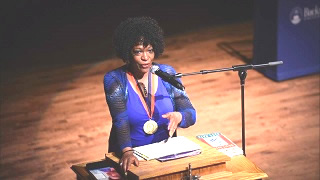
Rita Dove (Akron, 28 augustus 1952)
De Engelse dichter en literatuurcriticus Sir John Betjeman werd geboren in Londen op 28 augustus 1906. Zie ook alle tags voor John Betjeman op dit blog en ook mijn blog van 28 augustus 2009 en ook mijn blog van 28 augustus 2010.
A Bay In Anglesey
The sleepy sound of a tea-time tide
Slaps at the rocks the sun has dried,
Too lazy, almost, to sink and lift
Round low peninsulas pink with thrift.
The water, enlarging shells and sand,
Grows greener emerald out from land
And brown over shadowy shelves below
The waving forests of seaweed show.
Here at my feet in the short cliff grass
Are shells, dried bladderwrack, broken glass,
Pale blue squills and yellow rock roses.
The next low ridge that we climb discloses
One more field for the sheep to graze
While, scarcely seen on this hottest of days,
Far to the eastward, over there,
Snowdon rises in pearl-grey air.
Multiple lark-song, whispering bents,
The thymy, turfy and salty scents
And filling in, brimming in, sparkling and free
The sweet susurration of incoming sea.
Dawlish
Bird-watching colonels on the old sea wall,
Down here at Dawlish where the slow trains crawl:
Low tide lifting, on a shingle shore,
Long-sunk islands from the sea once more:
Red cliffs rising where the wet sands run,
Gulls reflecting in the sharp spring sun;
Pink-washed plaster by a sheltered patch,
Ilex shadows upon velvet thatch:
What interiors those names suggest!
Queen of lodgings in the warm south-west…
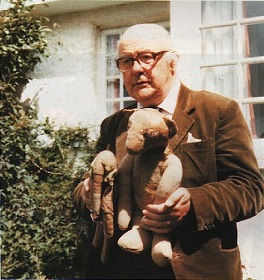
John Betjeman (28 augustus 1906 – 19 mei 1984)
De Duitse schrijver en vertaler Elmar Schenkel werd geboren in Hovestadt (Westfalen) op 28 augustus 1953. Zie ook mijn blog van 28 augustus 2009 en ook mijn blog van 28 augustus 2010
Uit: Keplers Dämon
„Die Wissenschaften existieren nur durch und mit den Menschen, die sie betreiben, die ihnen nachfolgen und sie anbeten oder niederreißen. Das erste Problem aller Wissenschaft ist genau dieses Wesen, das sich für das einzige Erkenntnis suchende Subjekt auf dieser Erde hält. Diese gattungsspezifischen Illusionen wurden von Swift gegeißelt, und bereits die Antike konnte darüber lachen. Schopenhauer und Nietzsche nahmen sich mit Vorliebe dieses in Illusionen verstrickten Tieres an. Erkenntnis suchend? Vielleicht ist auch dies nur eine weitere Form der Selbsttäuschung. So kann man auch Mary Shelleys revolutionären Roman über einen Mann, der dem Menschen ein Ebenbild schaffen will (so wie es laut Bibel und Koran Gott einst getan hat), lesen: als eine weitere Form der Täuschung, der Selbstanbetung der Spezies. Aber warum sollten Illusionen schlecht sein? Sie mögen eine Zeitlang als Schutz dienen, sind aber langfristig destruktiv. Der Frankenstein-Mythos, der bis in unsere Gegenwart reicht, zeigt dies sehr deutlich. Die Wissenschaften spiegeln beide Seiten des Menschen wider, unerbittlich. Mal retten, mal töten, mal verführen, mal helfen sie, mal lassen sie verzweifeln. Solche Wechselbäder werden an den beiden Protagonisten in Flauberts letztem Roman, Bouvard et Pécuchet, geradezu slapstickhaft bebildert. Für sie erweisen sich die Wissenschaften insgesamt als eine Enttäuschung – völlig überbewertet! Also kehren sie zu ihrem alten Beruf der Kopisten zurück.
In diesem ersten Teil, der mit »Mensch« überschrieben ist, geht es darum, wie biographische Situationen Begegnungen zwischen Wissenschaften und Literatur ermöglichen. Oft sind es krisenhafte Momente, in denen sie sich gegenseitig erkennen oder wiederentdecken nach einem langen gleichgültigen Nebeneinander – angefangen mit den nächtlichen Krisen, die wir Träume nennen, bis hin zu Lebenskrisen, wie bei Agatha Christie oder Paul Valéry.“
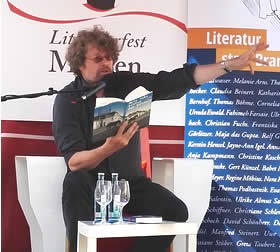
Elmar Schenkel (Hovestadt, 28 augustus 1953)
De Nieuw-Zeelandse dichteres en schrijfster Janet Frame werd geboren in Dunedin en groeide op in Oamaru. Zie ook alle tags voor Janet Frame op dit blog en ook mijn blog van 28 augustus 2009 en ook mijn blog van 28 augustus 2010.
Poets
If poets die young
they bequeath two thirds of their life to the critics
to graze and grow fat in
visionary grass.
If poets die in old age
they live their own lives
they write their own poems
they are their own might-have-been.
Young dead poets are prized comets.
The critics queue with their empty wagons ready for hitching.
Old living poets
stay faithfully camouflaged in their own sky.
It may even be forgotten they have been shining for so long.
The reminder comes upon their falling
extinguished into the earth.
The sky is empty, the sun and moon have gone away,
there are not enough street bulbs, glow-worms, fireflies to give light
and for a time it seems there will be no more stars.
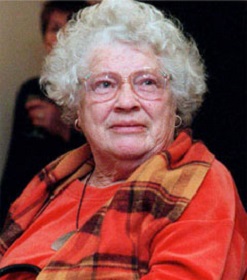
Janet Frame (28 augustus 1924 – 29 januari 2004)
De Canadese schrijver William Robertson Davies werd geboren op 28 augustus 1913 in Thamesville, Ontario. Zie ook alle tags voor William Robertson Davis en voor Robertson Davis op dit blog en ook mijn blog van 28 augustus 2009 en ook mijn blog van 28 augustus 2010.
Uit: Fifth Business
“My lifelong involvement with Mrs. Dempster began at 8 o’clock p.m. on the 27th of December, 1908, at which time I was ten years and seven months old.
I am able to date the occasion with complete certainty because that afternoon I had been sledding with my lifelong friend and enemy Percy Boyd Staunton, and we had quarrelled, because his fine new Christmas sled would not go as fast as my old one. Snow was never heavy in our part of the world, but this Christmas it had been plentiful enough almost to cover the tallest spears of dried grass in the fields; in such snow his sled with its tall runners and foolish steering apparatus was clumsy and apt to stick, whereas my low-slung old affair would almost have slid on grass without snow.
The afternoon had been humiliating for him, and when Percy as humiliated he was vindictive. His parents were rich, his clothes were fine, and his mittens were of skin and came from a store in the city, whereas mine were knitted by my mother; it was manifestly wrong, therefore, that his splendid sled should not go faster than mine, and when such injustice showed itself Percy became cranky. He slighted my sled, scoffed at my mittens, and at last came right out and said that his father was better than my father. Instead of hitting him, which might have started a fight that could have ended in a draw or even a defeat for me, I said, all right, then, I would go home and he could have the field to himself. This was crafty of me, for I knew it was getting on for suppertime, and one of our home rules was that nobody, under any circumstances, was to be late for a meal. So I was keeping the home rule, while at the same time leaving Percy to himself.
As I walked back to the village he followed me, shouting fresh insults. When I walked, he taunted, I staggered like an old cow; my woollen cap was absurd beyond all belief; my backside was immense and wobbled when I walked; and more of the same sort, for his invention was not lively. I said nothing, because I knew that this spited him more than any retort, and that every time he shouted at me he lost face.”
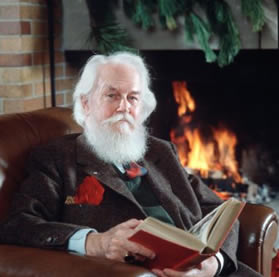
William Robertson Davies (28 augustus 1913 – 2 december 1995)
De Russische schrijver Joeri Valentinovitsj Trifonov werd geboren in Moskou op 28 augustus 1925.Zie ook alle tags voor Joeri Trifonov op dit blog en ook mijn blog van 28 augustus 2010.
Uit: The House on the Embankment (Vertaald door Michael Glenny)
“He said that the thought that had tormented Dostoyevsky – if man’s last refuge is nothing but a dark room full of spiders, then all is permitted – had hitherto been interpreted in a wholly simplistic, trivial sense. All such profound problems had, in fact, been distorted into pathetically inadequate form, but the problems themselves were still there and would not go away. Today’s Raskolnikov’s did not murder old women moneylenders with an ax, but they were still faced with the same agonizing choice: to cross or not to cross the line. In any case, what was the difference between using an ax and any other method?
(…)
GLEBOV: All my life I have tried to forget about that, and I nearly succeeded. Almost everything has been forgotten.
STRANGER: …People would be happy if they knew how to forget…
GLEBOV: Everything will be forgotten! I can’t remember anything! I forgot everything! But no, I remember some things… I hate those times, because they were my childhood!
(…)
GLEBOV: But if I don’t remember-that means nothing happened! You understand, time only exists within us! And if one doesn’t remember, it means, those times didn’t exist! Nothing existed!
GANCHUK: …You are making the same mistake as Kant: he suggests that time is the pure form of sensation…that it exists only in one’s conscience…and is expressed by the changing conditions of our conscience! …But we materialists know very well that time is the form of the movement of matter. And there is only one direction of this movement in time-mark this welll-from the past to the future!“
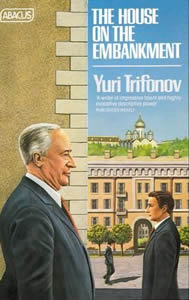
Joeri Trifonov (28 augustus 1925 – 28 maart 1981)
Cover
